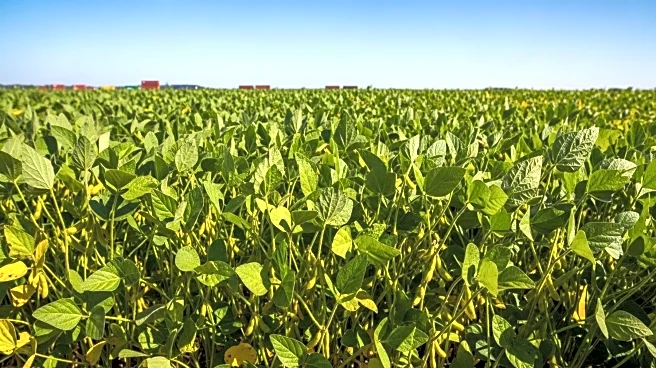What's Happening?
Brazil is set to achieve a record soybean harvest in the 2025/26 season, with projections indicating an output of approximately 177.6 million metric tons. This represents a 3-4% increase over the previous
year. The surge in production is attributed to expanded acreage, with farmers planting around 49 million hectares, marking a 3.6% year-over-year increase. Despite a rapid start to planting, dry weather conditions have stalled progress in key regions like Mato Grosso, where farmers have paused planting after covering 40% of the area due to lack of rain. Brazilian exports are soaring, driven by strong demand from China, which accounted for 93% of Brazil's soybean exports in September. By the end of October 2025, Brazil had shipped 102.2 million tons, surpassing the full-year totals for 2023/24.
Why It's Important?
The record soybean harvest in Brazil is reshaping global agricultural markets, particularly affecting U.S. exports. As China increasingly turns to Brazil for soybeans, U.S. farmers face declining demand amid trade tensions. This shift is causing U.S. soybean prices to fall, with futures trading near multi-year lows. The U.S. Soybean Association has expressed concern over the impact on American farm families, as Chinese demand for South American soybeans undermines U.S. sales. The situation highlights the broader implications of international trade dynamics and agricultural production shifts, with Brazil poised to dominate the global soybean market.
What's Next?
The future of Brazil's soybean market hinges on weather conditions, particularly the return of October rains, which are crucial for planting and yield outcomes. Analysts are closely monitoring the U.S.-China trade relationship, as any easing of tensions could alter demand patterns. Additionally, high input costs for fertilizers and fuel are affecting farmers worldwide, potentially influencing production decisions. The global market will continue to watch Brazil's harvest closely, as it sets new records and impacts supply chains and pricing.
Beyond the Headlines
The dominance of Brazil in the soybean market raises questions about the sustainability of agricultural practices and the environmental impact of expanded acreage. The reliance on a single country for such a significant portion of global supply also poses risks related to geopolitical stability and trade policies. As Brazil continues to expand its agricultural footprint, the long-term effects on biodiversity and land use will be critical areas for further exploration.









